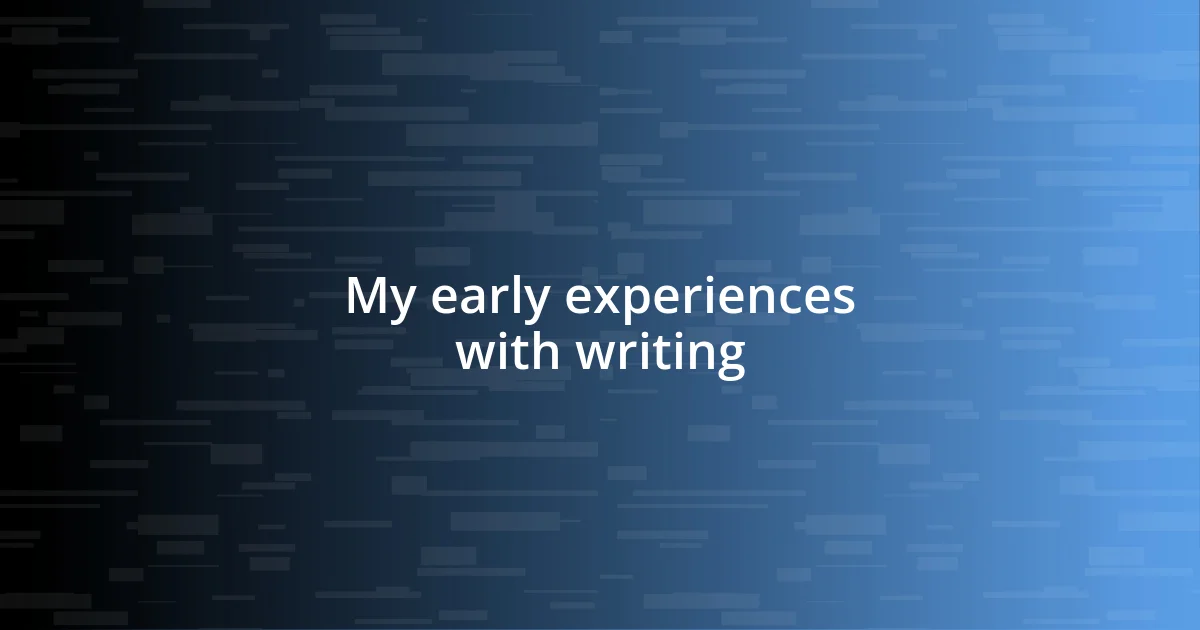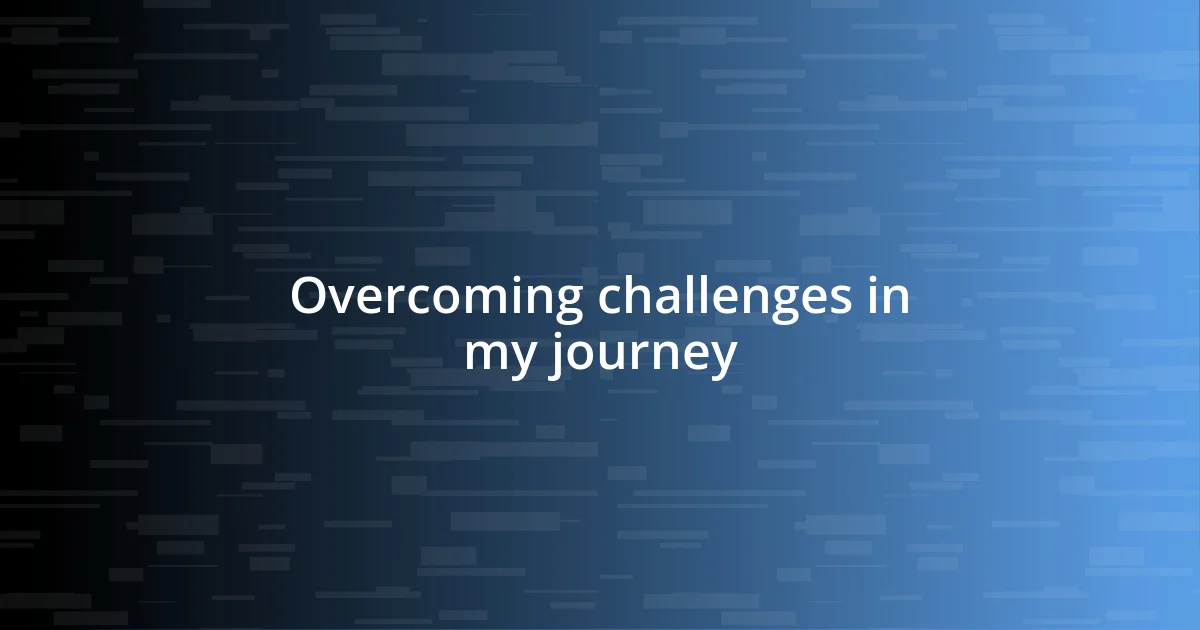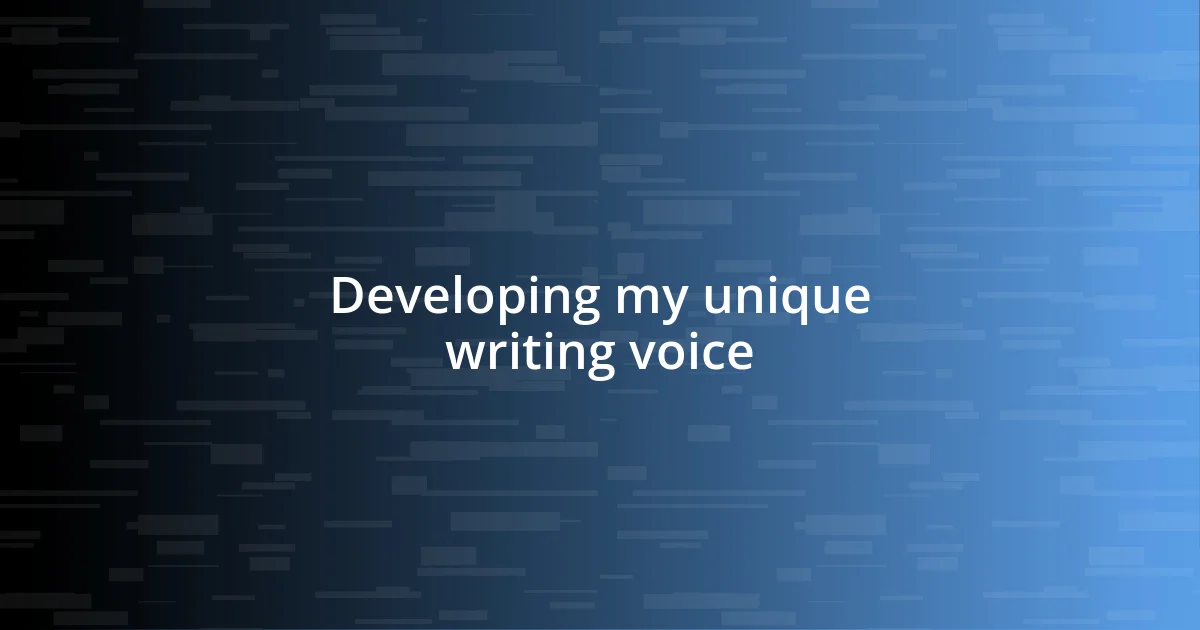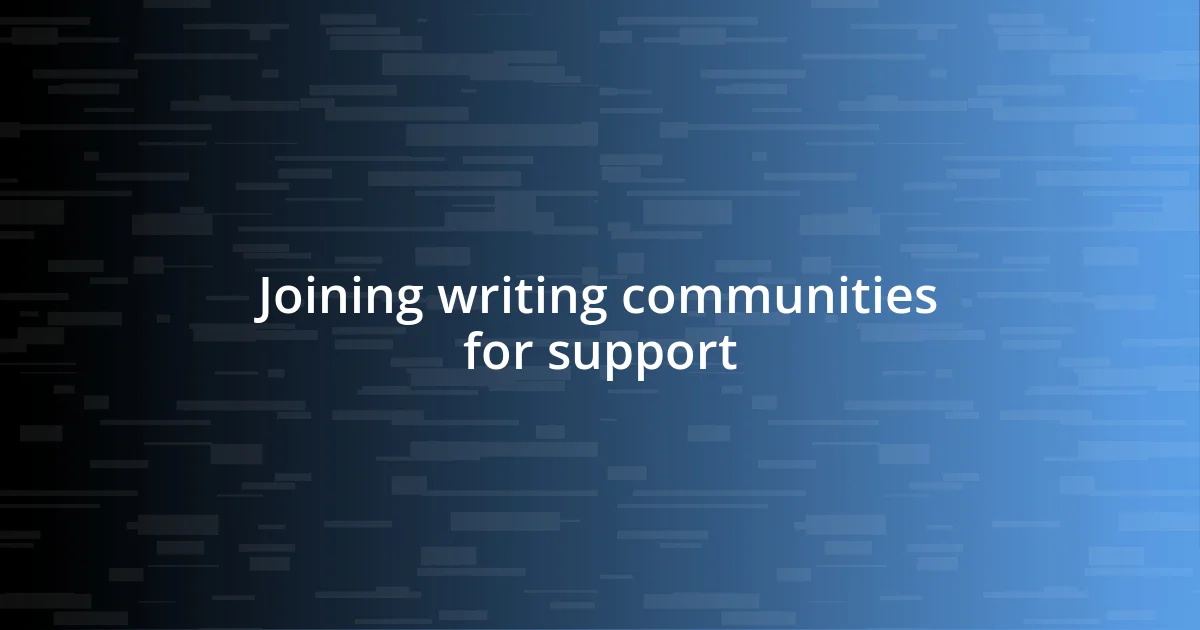Key takeaways:
- The author’s passion for writing began in childhood, with storytelling serving as an escape and a creative outlet.
- Overcoming challenges like self-doubt and writer’s block played a crucial role in developing resilience and a unique writing voice.
- Joining writing communities provided support, feedback, and inspiration, enhancing the author’s creativity and confidence in their work.

My early experiences with writing
From a young age, writing became my escape. I remember being no older than ten, sitting cross-legged on my bedroom floor, scribbling stories about fantastical adventures. Was it the thrill of creating new worlds or simply the joy of putting pen to paper? Either way, I felt alive with each word.
In middle school, I discovered the power of words in my English class. Our teacher assigned a project to write a short story, and as I crafted my narrative, the excitement of sharing my ideas began to bubble over. Reflecting back, I can’t help but wonder: was it in that moment that my love affair with writing truly began?
High school brought with it the chance to join the literary magazine, and it was here that I really honed my craft. I remember feeling a rush of pride when my poem was published for the first time. The overwhelming sense of validation was indescribable and made me realize how writing can connect us through shared experiences and emotions. Isn’t it incredible how a few words can resonate so deeply?

Finding inspiration in everyday life
Finding inspiration in everyday life often comes from unexpected moments. I recall a rainy afternoon, peering out my window, watching how droplets raced down the glass. Each drop told a story—some slowed and lingered, while others seemed desperate to reach the bottom. In that moment, I realized how the simplest sights could ignite the spark of creativity within me. It was a reminder that inspiration doesn’t always arrive in grand events; sometimes, it’s hiding in the mundane.
I like to think of inspiration as a game of catch. The more I look for it in my daily routine, the more it seems to bounce back to me. Walking through my neighborhood, I often find my mind racing with ideas when I notice a child’s laughter or a couple holding hands. These snippets of life fill me with warmth and give me a deeper appreciation for my surroundings, turning routine moments into a vivid canvas for storytelling. Have you ever felt how a small moment can lift your spirits?
One of my favorite sources of inspiration is the people I encounter. I remember chatting with an elderly gentleman at a café who shared stories from his youth that felt like a novel waiting to be written. His quiet wisdom and vivid memories revealed that everyone has a unique narrative, and I learned that tapping into those conversations can spark deeper reflection on my own experiences. It’s fascinating how connecting with others can unlock new perspectives that I never even realized existed.
| Source of Inspiration | Example |
|---|---|
| Nature | Watching raindrops on a window |
| Everyday Moments | Seeing children playing in the park |
| People | Conversations with strangers |

Overcoming challenges in my journey
Over the years, I faced numerous challenges that tested my resolve as a writer. I remember vividly the self-doubt that crept in after receiving criticism for my early work. It felt like a punch to the gut; however, instead of discouraging me, it pushed me to refine my voice. Embracing constructive feedback became a crucial turning point in my journey.
Here are some of the challenges I remember overcoming:
- Fear of Rejection: Each time I submitted an article or story, my heart raced. I learned that rejection is part of the process, helping me build resilience.
- Writer’s Block: There were countless days when the words just wouldn’t flow. It taught me the importance of stepping back and reclaiming my creativity, often through a change of scenery.
- Time Management: Balancing writing with other commitments was tough. I quickly realized that setting aside dedicated time for my craft made all the difference.
- Comparing Myself to Others: I often found myself measuring my progress against established writers. Overcoming this mindset was liberating; I came to appreciate my unique journey.
- Keeping Motivated: There were moments I questioned whether I would ever find my “big break.” I started creating small goals, which turned daunting projects into manageable tasks, reigniting my passion.
These hurdles shaped my writing identity, reinforcing the belief that every setback can be a catalyst for growth.

Developing my unique writing voice
Developing my unique writing voice was a journey filled with self-discovery. I remember sitting on my bedroom floor, surrounded by notes and scribbled ideas, trying to find a consistent tone. It was frustrating at times, but I realized that my authentic voice was like a fingerprint—unique to my experiences and perspectives. Have you ever thought about how your personal story influences your writing style?
One significant moment came when I started experimenting with different genres. I decided to pen a poem about a boy and his dog, drawing from my own childhood memories. While writing it, I could feel the nostalgia pouring out on the page. That act of tapping into my own emotions allowed me to convey deeper meaning and connect with readers in ways I hadn’t anticipated. It made me understand that vulnerability is a powerful tool in storytelling.
As I evolved, I learned that reading widely helped refine my voice too. I began to notice how authors like Anne Lamott and Neil Gaiman approached storytelling with their unique styles, making me wonder what elements resonate most with me. I tried mimicking their techniques for fun, discovering bits of their flair infused into my words. This exploration taught me that finding your voice isn’t just about structure or grammar; it’s also about embracing the influence of others while staying true to my identity. What aspects of other writers draw you in, and how do you think they shape your own expression?

Joining writing communities for support
Finding my footing in the world of writing greatly benefited from joining various writing communities. I recall the first forum I stumbled upon; it was like stepping into a vibrant, welcoming space where people shared not only their work but also their struggles. Seeing others grapple with the same fears and doubts reassured me that I wasn’t alone. Have you ever felt that sense of belonging? It’s transformative.
Through these communities, I received invaluable feedback that helped refine my craft. For instance, one time, a fellow writer pointed out a recurring theme in my stories that I hadn’t even recognized. It was this keen insight that nudged me toward exploring those themes more deeply, ultimately enriching my narratives. I’ve often wondered, how can we fully grow without the perspectives of others to challenge and inspire us?
The support from fellow writers not only boosted my confidence but also sparked creativity. I remember participating in a monthly challenge where we would write stories based on random prompts. The variety of responses was eye-opening! This experience kept my writing fresh and expanded my horizons. Have you ever tried writing on a whim? Sometimes, spontaneity leads to some of the most profound discoveries in writing.














